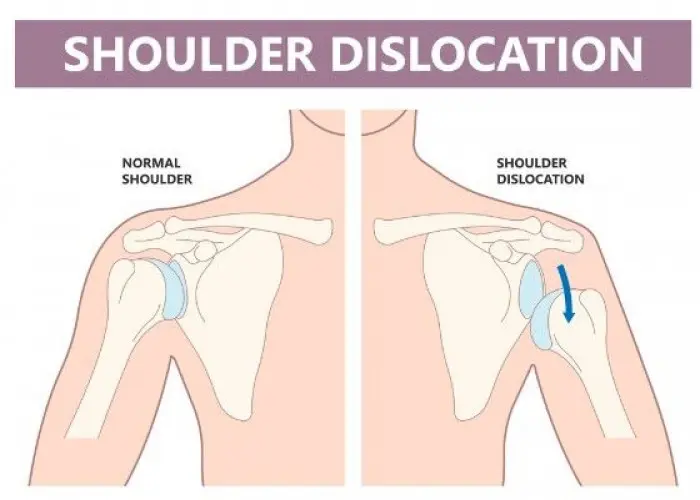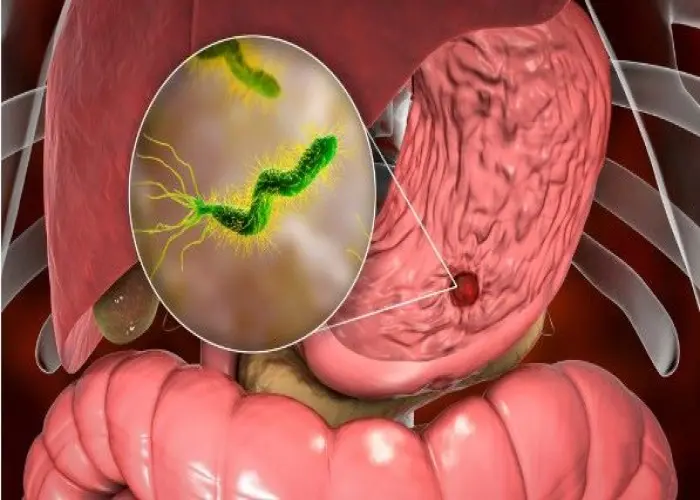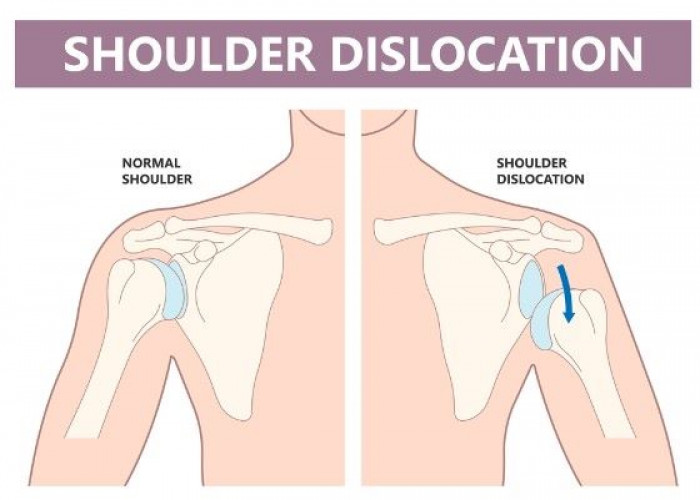 Welcome
Welcome
“May all be happy, may all be healed, may all be at peace and may no one ever suffer."
Dislocated shoulder

A dislocated shoulder occurs when the upper arm bone (humerus) comes out of the shoulder socket. This is a common injury, especially in athletes and those who engage in high-impact activities.
Symptoms of a dislocated shoulder include severe pain and weakness in the affected arm, as well as visible deformity of the shoulder joint. The arm may also be numb or tingly, and it may be difficult to move or lift the arm.
Diagnosis of a dislocated shoulder typically involves a physical exam and imaging tests such as X-rays or MRI to confirm the diagnosis and rule out other injuries such as fractures or soft tissue damage.
Treatment of a dislocated shoulder typically involves reducing the dislocation, or putting the arm bone back into the shoulder socket. This is typically done in a hospital setting, under anesthesia or heavy sedation. After the joint is reduced, a sling or immobilizer may be applied to immobilize the shoulder and allow it to heal. Physical therapy may also be recommended to help restore range of motion and strength in the affected arm.
In some cases, surgery may be required to repair any damage to the surrounding tissues or bones, or to treat complications such as nerve damage or fractures.
After a dislocated shoulder, it is important to rest the affected arm and avoid activities that may cause further injury. Rehabilitation exercises and physical therapy can help to improve strength and range of motion in the shoulder, and prevent future injuries.
In conclusion, a dislocated shoulder is a common injury that occurs when the upper arm bone comes out of the shoulder socket. Symptoms may include severe pain, weakness, and visible deformity of the shoulder joint. Treatment typically involves reducing the dislocation, immobilizing the shoulder, and undergoing physical therapy to restore range of motion and strength in the affected arm. If you suspect that you or someone you know may have a dislocated shoulder, it is important to seek medical attention immediately to receive a proper diagnosis and treatment.
Research Papers
Disease Signs and Symptoms
- Shoulder pain
- Swollen shoulder
- Joint pain
- Dislocated shoulder
Disease Causes
Dislocated shoulder
The shoulder joint is the most frequently dislocated joint of the body. Because it moves in several directions, your shoulder can dislocate forward, backward or downward, completely or partially, though most dislocations occur through the front of the shoulder. In addition, fibrous tissue that joins the bones of your shoulder can be stretched or torn, often complicating the dislocation.
It takes a strong force, such as a sudden blow to your shoulder, to pull the bones out of place. Extreme rotation of your shoulder joint can pop the ball of your upper arm bone out of your shoulder socket. Partial dislocation — in which your upper arm bone is partially in and partially out of your shoulder socket — also may occur.
A dislocated shoulder may be caused by:
- Sports injuries. Shoulder dislocation is a common injury in contact sports, such as football and hockey, and in sports that may involve falls, such as downhill skiing, gymnastics and volleyball.
- Trauma not related to sports. A hard blow to your shoulder during a motor vehicle accident is a common source of dislocation.
- Falls. You may dislocate your shoulder during a fall, such as from a ladder or from tripping on a loose rug.
Disease Prevents
Dislocated shoulder
To help prevent a dislocated shoulder:
- Take care to avoid falls
- Wear protective gear when you play contact sports
- Exercise regularly to maintain strength and flexibility in your joints and muscles
Once you've dislocated your shoulder joint, you may be more susceptible to future shoulder dislocations. To avoid a recurrence, follow the specific strength and stability exercises that you and your doctor have discussed for your injury.
Disease Treatments
Dislocated shoulder treatment may involve:
- Closed reduction. Your doctor may try some gentle maneuvers to help your shoulder bones back into their proper positions. Depending on the amount of pain and swelling, you may need a muscle relaxant or sedative or, rarely, a general anesthetic before manipulation of your shoulder bones. When your shoulder bones are back in place, severe pain should improve almost immediately.
- Surgery. You may need surgery if you have a weak shoulder joint or ligaments and tend to have recurring shoulder dislocations despite proper strengthening and rehabilitation. In rare cases, you may need surgery if your nerves or blood vessels are damaged.
- Immobilization. Your doctor may use a special splint or sling for a few days to three weeks to keep your shoulder from moving. How long you wear the splint or sling depends on the nature of your shoulder dislocation and how soon the splint is applied after your dislocation.
- Medication. Your doctor might prescribe a pain reliever or a muscle relaxant to keep you comfortable while your shoulder heals.
- Rehabilitation. After your shoulder splint or sling is removed, you'll begin a gradual rehabilitation program designed to restore range of motion, strength and stability to your shoulder joint.
If you have a fairly simple shoulder dislocation without major nerve or tissue damage, your shoulder joint likely will improve over a few weeks, but you'll be at increased risk for future dislocation. Resuming activity too soon after shoulder dislocation may cause you to injure your shoulder joint or to dislocate it again.
Disease Diagnoses
Disease Allopathic Generics
Disease Ayurvedic Generics
Disease Homeopathic Generics
Disease yoga
Dislocated shoulder and Learn More about Diseases

Trigeminal neuralgia

Cyclospora infection

Gallbladder cancer

Panic attacks and panic disorder

Anaphylaxis

Dyslexia

Duodenal Ulcer

Urinary tract infection (UTI)
dislocated shoulder, স্থানচ্যুত কাঁধ
To be happy, beautiful, healthy, wealthy, hale and long-lived stay with DM3S.
